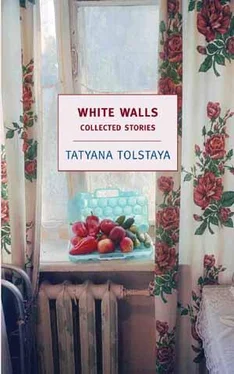Long, long ago, on the far side of dreams, childhood reigned on earth, the winds slept quietly beyond the distant, dark blue woods, and Zhenechka was alive…. And now, from the herbarium of bygone days which grows with every year—green and motley days, dull and brightly colored ones—memory fondly extracts one and the same pressed leaf: the first morning at the dacha.
On the first morning at the dacha, the damp glassed-in veranda still swims in green, underwater shadow. The front door is open wide, cold creeps in from the garden; the pails are in place, empty and resonant, ready for a run to the lake, to the smooth, blinding lake, where the reflected world fell upside down in the early hours of the morning. The old pail gurgles, a distant echo gurgles. You ladle the deep, cold silence, the stilled, smooth surface, and sit for a while on a fallen tree.
Cars will soon start honking outside the gates of the dachas, summer folk will pour out of the automobiles, and, sighing and moaning, a taxi-truck will turn around in the narrow, wooded dead end of the road, scraping on the low branches of maples, breaking off the fragile flowering elder. It will give a gasp of blue smoke and fall quiet. In the returning silence the only sound will be the thunder of the truck’s wood side-panels dropping, and on its high platform strangers’ belongings, crowned with an upturned Viennese chair, will be shamelessly revealed to the eye.
And one automobile will drive straight through the gates, and from the wide-flung door will emerge a firm, elderly hand gripping a walking stick, then a leg in a high-buttoned orthopedic shoe, then a small straw hat with a black ribbon, and finally smiling Zhenechka herself, who will straightaway cry out in a high voice: “Look at the lilacs!” and then, “My suitcases!” But the bored driver will already be standing with the canvas bags in both hands.
Zhenechka will hurry into the house, exclaiming loudly over the aromas of the garden; she’ll push open the casements impatiently, and with both hands—strong like a sailor’s—pull branches of lilac into the rooms, their cold, purple curls rustling with noisy importance. Then she’ll hurry to the sideboard to see whether the winter mice have broken her favorite cup, and the cabinet will grudgingly open its swollen doors, behind which Zhenechka’s treasure whiled away the January nights alone in the stale, empty depths, alone with a graying, forgotten cookie.
She will walk through the rooms, as yet unwarmed by the sun; she’ll unpack, hand out presents crackling with paper, shake fruit fudge and sweet cakes from packets, cram the corners of the rooms with bouquets of wild flowers, hang our smiling photographs above her bed; then she’ll clear the desk, and stack it with textbooks, dictionaries, and dictation books. Not a single idle day will she allow us; she’ll sit us each down for at least an hour of lessons geared to our respective ages. “We are legion—you can’t teach us all!” We’ll wriggle and hop about in front of Zhenechka. “Yes, I can,” she’ll answer calmly, looking for the inkwell. “Take pity on yourself,” someone will whine. “Like Pushkin says, we’re disgusting, lazy—no curiosity….” “All of you are going to grow up to be educated people.” “We won’t grow up! We’re slaves to our stomachs! We’re denizens of the dark kingdom! Take the books and burn them all!” “Never mind, we’ll manage,” says Zhenechka, and she’ll seize us roughly and kiss us each harshly with a convulsive love we accept indulgently: All right, let her love us. Already she’s dragging the first victim to her lesson, saying, as always, “I taught your mama, you know. Your grandmother and I were childhood friends….”
And on her chest, in the folds of her dress, her hearing aid begins to chirr like a nightingale—the hearing aid that for some reason never works quite right. Well, then, we’re back to lessons again, exercises and dictations; once again, sitting in the creaky wicker armchair, propping her bad leg against the walking stick, Zhenechka, in her measured voice, will begin patiently turning us into educated people, and with the heedlessness of childhood, we will again start to bait her. We’ll crawl into the room where the current captive languishes at the copybook; we’ll crouch behind Zhenechka’s armchair—her hunched linen back, her clean soap smell, the willow creak—and take advantage of her deafness to prompt the giggling victim with wrong or indecent or ridiculous answers, or pass notes with calls to rebel against the slave driver, until Zhenechka notices something’s up and, all in a dither, banishes the spies.
And beyond the windows, beyond the tinted panes: a fresh, flowered stillness, warm shadows beneath the pines, and the midday lake filled with blue, glinting through the boughs, all covered with patches of sun, with fleet wedges of rippled brightness…. But here we are, locked indoors, the table covered in green blotting paper, the thumbtacks rusted over the winter, the ink stains bleeding an official-looking lilac rainbow. And everything Zhenechka says—is boring, correct, old. If only shed go into the garden or go drink coffee! “Zhenechka, how much longer?” “Underline the subject with one line, the predicate with two….” “Zhenechka, the summer will be over!” The willow armchair gives a heavy sigh, the blue eyes gaze with calm reproach, the patient voice says: “There’s a time to sow and a time to reap…. Sluggards never make scholars…. Live and…”
Ohh, isn’t there something she’s dying to do?
The evening fades, the dust on the road grows cold, dogs bark far away. We lie in our beds on cool pillows, listening to the sighs and purrs of the day winding down, the whispers of doors, muffled laughter. From the attic—lighter than shadow, quieter than dust—dreams descend, surging in a transparent wave and confusing what has been with what never was.
Knocking, squeaking, and rustling, groping through the twilight of the house, Zhenechka makes her way to our beds, settles in, and takes up an unending story about bygone years —about the children she taught and loved, about the wind that scattered them throughout the wide world: some disappeared, some grew up and forgot, some returned to dust. Dreams swirl like a warm shadow; from the invisible cloud of soap and mint only her voice emerges, sympathetic and soft, then cooing and enraptured, unhurried, like a blissful June day. Transparent visions float in dozing waters: a boy surfaces, a faraway dark-eyed, light-haired, antique boy, who long, long ago lay just like this in a dizzyingly distant white bed and listened to the murmur, the gurgle, the rise and fall of Zhenechka’s voice—a boat rocking on waves of drowsiness. His eyes drooped and shut, his fingers relaxed, his speechless lips parted—for the dark-eyed boy was mute. That’s why Zhenechka was asked to come: to pity, love, and care for him; to croon lullabies and babble fairy tales about dark forests, about the cat and the wolf, about the seven orphaned goats; and, as the boy fell asleep, his muteness mingled with the night’s, and his bed set sail under the low vault of dreams.
Zhenechka had been in our house from time immemorial, and through the darkness of infancy I can make out her blue gaze bent over me on the day when the good fairies customarily gather with gifts and greetings for the newborn. I don’t know what gift she intended for me: amid the bounty of gifts called life, Zhenechka’s own gift, humble and small, could easily have been lost, or maybe she had nothing to offer but herself, nothing but the steady glow of love and tranquillity that emanated from her smooth, clear soul.
Once she gave one of us, one of her girls, a pretty box: luxurious, satin, full of light blue envelopes for love letters. Embarrassed, she threw back the top, so that its taut blue silk reins quivered; on the inner side, hidden from idle eyes, she had written in her clear schoolteacher’s hand: “If you were to ask for advice, I would say only one thing: Don’t wish to be the prettiest, wish to be the most beloved.” And we did wish this. But nothing came of it, of course, no more than it did for Zhenechka herself.
Читать дальше












